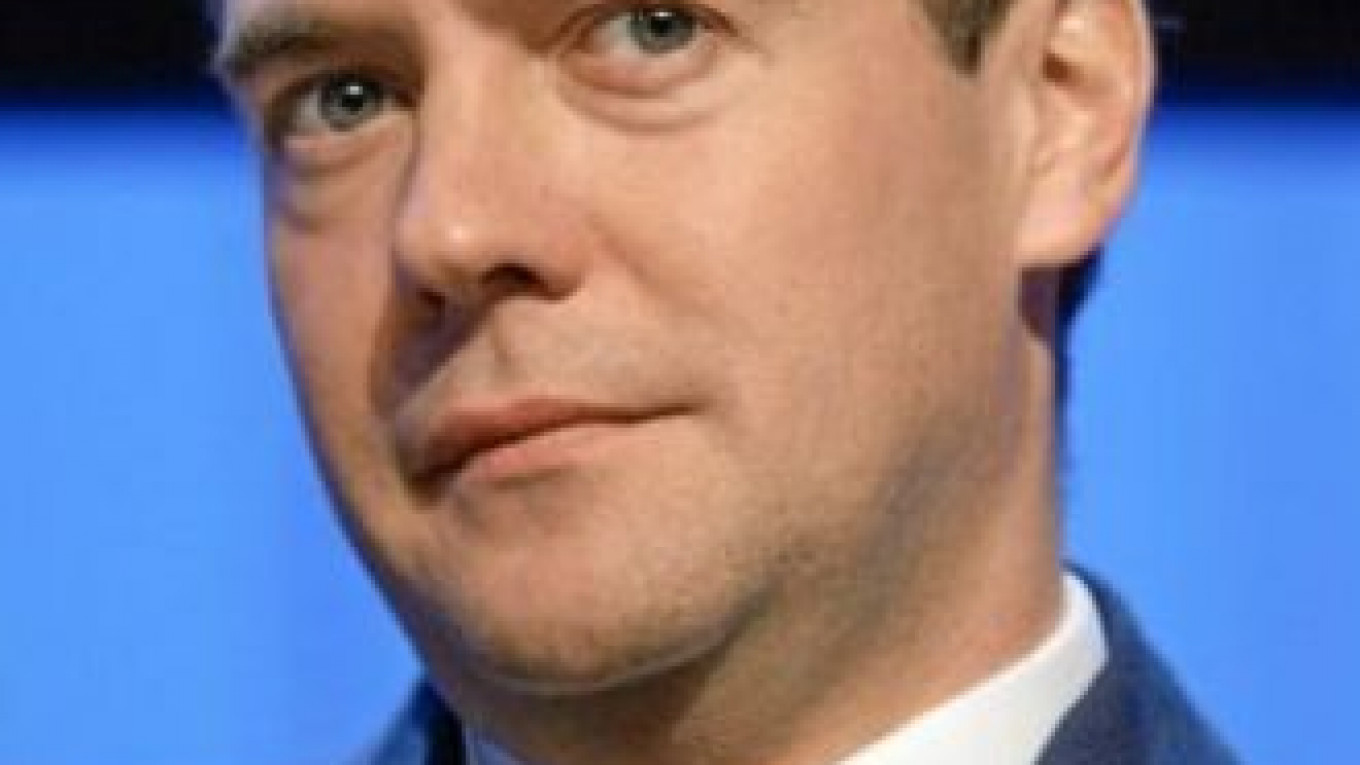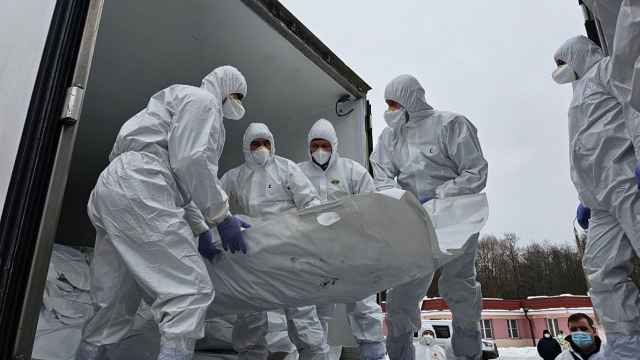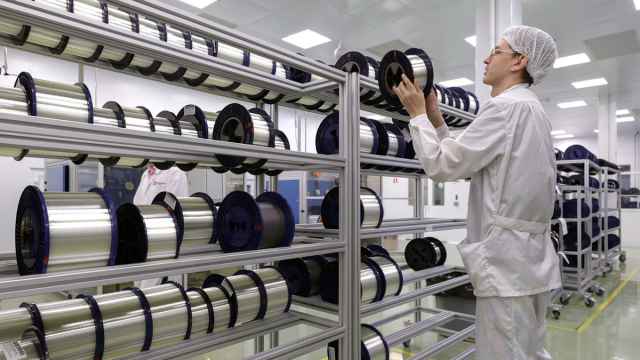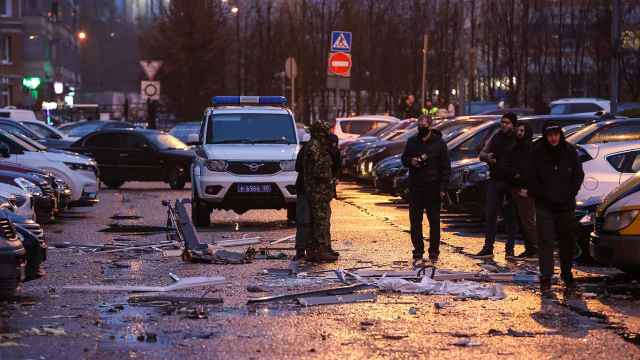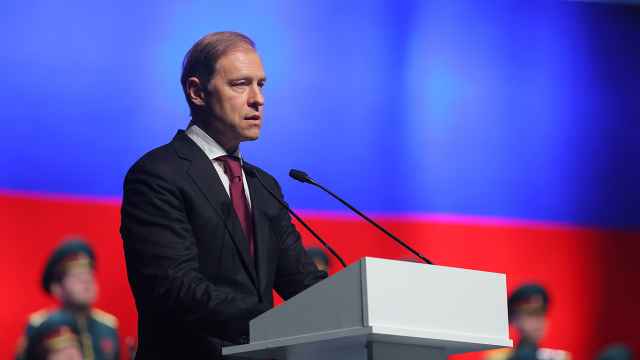Improving the work of the government and fighting corruption should be key priorities on Russia's reform agenda for the next few years, participants in the World Economic Forum said Wednesday.
Almost 78 percent of them chose ensuring "good governance" as the No. 1 step for the country's progress during an interactive vote that took place at a panel session on Russia's future development.
Prime Minister Dmitry Medvedev, who arrived in the Swiss town of Davos to deliver a speech at the forum, said he was not surprised with the results of the vote.
"I'll be frank with you, I was absolutely certain that the overwhelming majority would vote for No. 1," he told international business leaders and politicians who were present in the congress hall. "It was clear from the beginning … because it reflects the view of Russia and its problems at the moment."
A total of 9.7 percent of the panel session participants voted for driving market competition as the main reform to be carried out. Regional development won 7.2 percent of votes, while ensuring social cohesion and macroeconomic stability got 2.7 percent and 2.5 percent of votes, respectively.
Medvedev's vision turned out to be different from that of the majority. "I voted for a different option," he said without elaborating. But, he acknowledged that increasing efficiency of government institutions is a critical point on his Cabinet's agenda, as poor governance stalls other reforms.
To improve the situation, Medvedev said, an active and systematic dialogue between the government officials and the civil society is needed. The prime minister, who was checking with the notices on his tablet while speaking, pushed for a broader use of state-of-the-art technologies as a new format of cooperation between society and government officials.
To facilitate dialogue with the people, the government should rely on modern communication technologies that help reduce the existing distance between the citizenry and the authorities and ensure "a continuous contact — not just from one election to the next," Medvedev said.
"This allows society to control the authorities and provide information on the extent of its satisfaction with decisions that had been made," he added.
Successful institutional reforms are possible only if authorities act "wisely" responding to the growing demands of civil society, the prime minister said.
"Our civil society today is different from what it used to be five to seven years ago. … I think it's good because our civil society has become more mature," Medvedev said. "Our civil society is making demands to the authorities, and sometimes it does it in an uncompromising and cruel way."
Medvedev reiterated the government's position that the process of expressing people's opinion must not violate the existing law.
Russia has been facing an unprecedented wave of opposition protests over the last years, with thousands of people flooding the streets to express discontent with the government's policies.
Medvedev pointed out that the government had responded to some of the demands set by society. One measure, he said, involved facilitating registration of political parties that he initiated as a president in late 2011.
He pointed out that competition between political forces inside the country is no less important for its development than competitiveness of companies in major segments of the economy. To ensure commercial competition, he said, the government aims to create equal conditions for doing business in Russia and reducing state presence in the economy.
"I hope that we'll reach our targets and that we can earn even more this year than last year," the prime minister told Bloomberg television earlier that day, referring to the privatization program. He added that the government is considering different ways of selling state assets, but listing them on a bourse is a better option than selling to strategic investors, as the goal is to develop trading on the Moscow stock exchange.
Commenting on the competition issue, the prime minister didn't rule out lifting the domestic monopoly of state-owned gas giant Gazprom, if that doesn't result in the country losing money. He also rejected speculations about Gazprom as a political tool for the government.
"I think that Gazprom does not have the political role being ascribed to it. Gazprom is just earning money," Medvedev said, adding that the importance of the company as a gas supplier to Europe becomes even more obvious in Davos' cold winter weather.
Forum visitors were given metal chains to attach to their shoes, in order not to slip on the ice, said Yan Yanovsky, managing partner at First Nation Societe Bancaire, Business FM radio reported Wednesday. "The ground is very slippery, the streets are being cleaned very poorly … Many [attendees] have fallen already," he said.
n Prime Minister Dmitry Medvedev said he would not compete with President Vladimir Putin in the next presidential election in 2018.
Medvedev said in an interview with Bloomberg television Wednesday on the sidelines of the World Economic Forum in Davos that he does not consider Putin a rival, since the incumbent president represents the "same political power."
Contact the author at [email protected]
Related articles:
A Message from The Moscow Times:
Dear readers,
We are facing unprecedented challenges. Russia's Prosecutor General's Office has designated The Moscow Times as an "undesirable" organization, criminalizing our work and putting our staff at risk of prosecution. This follows our earlier unjust labeling as a "foreign agent."
These actions are direct attempts to silence independent journalism in Russia. The authorities claim our work "discredits the decisions of the Russian leadership." We see things differently: we strive to provide accurate, unbiased reporting on Russia.
We, the journalists of The Moscow Times, refuse to be silenced. But to continue our work, we need your help.
Your support, no matter how small, makes a world of difference. If you can, please support us monthly starting from just $2. It's quick to set up, and every contribution makes a significant impact.
By supporting The Moscow Times, you're defending open, independent journalism in the face of repression. Thank you for standing with us.
Remind me later.


